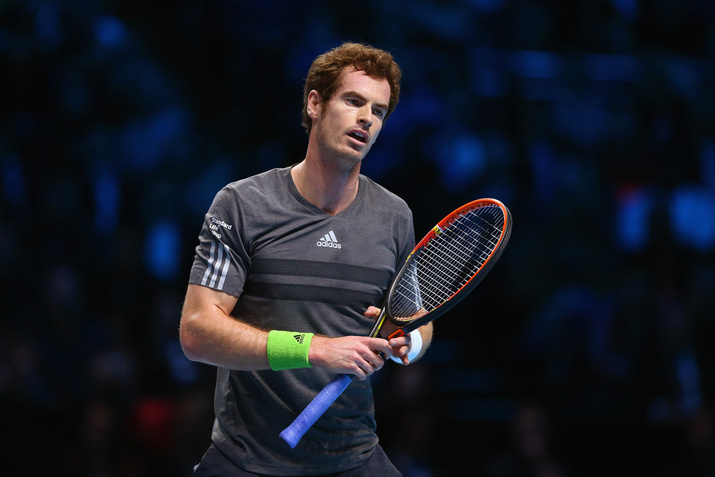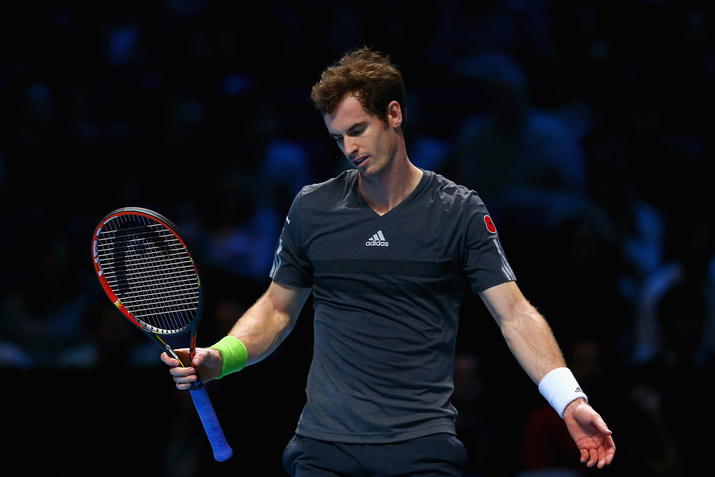Don't miss any stories → Follow Tennis View
FollowViewpoint on the End of Andy Murray's Enigmatic Season
How do you react to such an event? As he sat around in the pre-match dissection, the victor chose a shudder, an involuntary full-body twitch followed by an inelegant shuffle in his seat. For the first time in the history of tennis, there seemed a hint of uncertainty to Roger Federer's speech - the typical smooth and endlessly flowing delivery disturbed and reduced to a series of stumbling ellipses.
“At the end, I was happy I didn't win the second to last game to be quite honest,” he said. “Yeah, it's uncomfortable… I don't know…I don't like it.”
It was a peculiarly revealing moment after such a demolition of a victory. For one, because on the court in the heat of the moment, there was rightfully no sympathy to be seen. Federer was going after the double bagel, he was going for perfection. Murray found his way to game point, but Federer wrestled it back. Two points stood between himself and his greatest humiliation dished out in a career built on inflicting humiliating defeats on so many. But Murray eventually found his serve and held for the first time at the last opportunity.

Without so much of a glance up, Federer pivoted on one heel and strode to collect himself beyond the baseline, disgust flickering across his face. This was not the look of someone who was relieved to lose a game.
Federer is famed for reveling so triumphantly whenever the opportunity presents itself to exercise his gold-tinged superiority over his closest rivals. In the past, he has happily fired verbal shot after glorious verbal shot at Andy Murray. Although tensions between Federer and the two later-arriving members of the old Big Four have waned in recent years, sympathy isn't what one would expect.
But, apparently, this is Andy Murray's current place in the tennis world: universal reverence replaced with universal sympathy. A 6-0 6-1 loss is disheartening enough, but the victor then expressing remorse over the dominance of that performance is a hammer blow of an inadvertent insult. Mockery probably means you're an active factor in the elite society of the tennis world, while sympathy hints at an abject irrelevance.
Seven weeks ago, as the realization registered that he would likely be idly sitting around as the ATP World Tour Finals raged on in his city of residence, this result perhaps wouldn't have destroyed the soul quite as thoroughly. He was clearly in poor form and evidently struggling. The gulf was wide, vast, and deep.
But the six weeks that followed were supposed to represent this triumphant rise to a level somewhere vaguely within the proximity of the top five. Murray had done everything right. He won countless matches. He lifted trophies. He beat top-10 players. He rediscovered the famous Murray competitive fire, storming back from the brink of defeat multiple times. He was a few hundred points from reuniting with the fourth spot he practically owns.
But the tell-tale signs were always there if you looked. Or, rather, the fact that not too much had actually shifted. The comebacks against Tommy Robredo were cause for celebration, but those celebrations ignored the fact itself: barely surviving multiple hard-court matches against Tommy Robredo. It was not a pattern that boded well for when Murray was finally exposed to the very best on multiple occasions in one week.
The admirably vast effort expended by Murray en route to London always really appeared a most elaborate, typically masochistic walk to death row. At times there was hope, and there were points when many could have sworn the light at the end of the tunnel was near, but the tears at the end were always coming.

At the beginning of the tournament, Murray was asked about conquering the final frontier of his return from back surgery: those three players who have forever stood above him. He was full of hope and belief. He characteristically used the opportunity to, as only Andy Murray can, dryly remind all present that they had spent the entire year questioning him about victories over top-20 players and then top 10, accomplishments that he slowly but systematically ticked off the list. The comment was copied, pasted, laughed at, and lauded as Vintage Andy Murray.
But that wasn't the phrase that stuck. His most crucial words were actually a well-worn cliché whispered in passing. Not so much important at the time, but as Tomas Berdych has spent the week alternating between breaking into a cold sweat and suffering a half-seizure whenever Novak Djokovic's name was mentioned, his disclosure that “half the battle” against those three lay in his self-belief was so striking.
Six days later, back in the same seat, that belief had all but evaporated. Inevitably, some of the words that followed were mumbled out in the heat and disappointment of such a rancid moment. But there were one answer that - even in bitter defeat - sounded so unlike Murray, so unrecognizable, so defeated, and hinted at just how far he still has to travel mentally, as well as physically.
“I can say I'm disappointed with my level tonight,” Andy sighed. “But if I played well, he probably still would have won anyway.”










